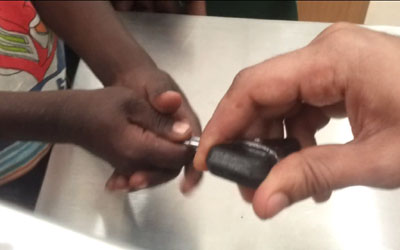5-year-old child was brought with complaints of
loss of appetite and not gaining weight. There was no history of contact
with tuberculosis and other systemic illness. Diet history revealed
inadequate calorie intake.
On examination, child was alert, active, oriented
with normal speech output. His weight (13 kg) was <3rd centile and
height (110cm) was at 50th centile. His mid arm circumference was 14.5
cm. Detailed examination of all muscle groups revealed hypertrophy of
arm, thigh and leg muscles, with normal muscle power and tone. Upper
limb and lower limb reflexes were brisk. Plantar response was flexor. On
further examination, percussion myotonia and grip release myotonia of
upper limb was present (Web Video 1
and Fig. 1). We made a provisional diagnosis of
myotonia congenital. He was treated with phenytoin for myotonia, and
dietary advice for adequate weight gain.
 |
|
Fig. 1 Elicitation of myotonia
in a child.
|
Myotonia is defined as a disturbance in muscle
relaxation after voluntary contraction. Common diseases of children
associated with myotonia include Myotonia congenita, Myotonia fluctuans
and Neuromyotonia. In these disorders, weakness is not prominent but
stiffness may impair muscle function. Abnormalities in the potassium and
chloride channels underlie most cases. Myotonia associated with muscle
hypertrophy is characteristic of Myotonia congenital (Beckerís type).
EMG establishes the diagnosis. Repetitive discharges at rates of 20 to
80 cycles per second are recorded when needle is inserted into the
muscle. The waxing and waning of the amplitude and frequency of
potentials produce a characteristic sound. Mexilitine and Phenytoin is
used for reducing muscle stiffness in myotonia. This case scenario
explains the need of eliciting myotonia in children with muscle
hypertrophy to differentiate from muscular dystrophies, as children with
myotonia with muscle hypertrophy are easily treatable.

